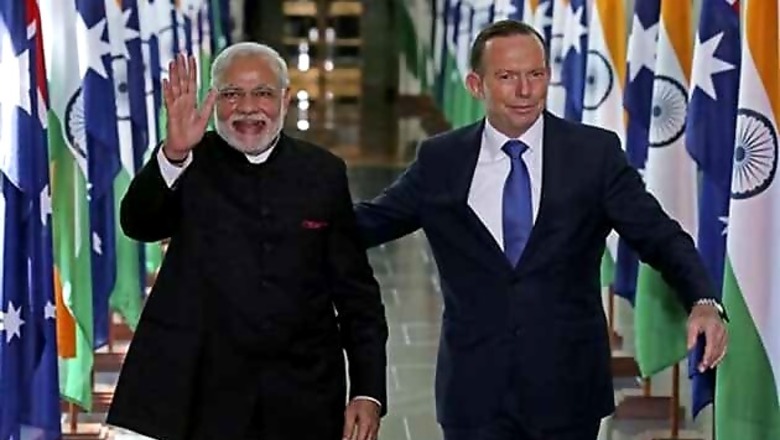
views
Canberra: India and Australia on Tuesday sought early conclusion of negotiations for a comprehensive economic partnership agreement and a closure on the civil nuclear deal as Prime Minister Narendra Modi and his counterpart Tony Abbott held talks.
After the two leaders held talks, India and Australia signed five pacts on social security, transfer of sentenced prisoners, combating narcotics trade, tourism, and Arts and Culture.
"We also agreed on seeking early closure on the civil nuclear agreement, which will give Australia a chance to participate in one of the most secure and safe nuclear energy programme in the world," Modi said in a statement to the media at a joint press conference with Abbott.
Later, while addressing the Parliament, Australian Prime Minister Abbott said, "If all goes well, Australia will export uranium to India under suitable safeguards because cleaner energy is one of the most important contributions that Australia can make to wider world."
Modi, while talking about India-Australia ties, said, "This is a natural partnership, arising from our shared values and interests, and our strategic maritime locations. India and Australia have a great economic synergy."
"There are huge opportunities for partnership in every area we can think of -- agriculture, agro-processing, resources, energy, finance, infrastructure, education, and science and technology," Modi said.
Abbott, in Parliament, said, "By the end of the next year we will have a Free Trade deal with what is potentially the world's largest market."
Modi emphasised that the economic climate in India has changed.
"I believe it will be a lot easier to convert opportunities into concrete outcomes," Modi said.
Modi also announced that India will organise a 'Make in India' show in Australia in 2015 while Australia would hold a business week in India in January 2015.
"Prime Minister Abbott and I discussed what we should do to impart real momentum to our economic partnership. Reconstituting the CEO Forum is an important step. We have agreed to speed up negotiations on the Comprehensive Economic Partnership Agreement. I also asked for easier access for Indian business to the Australian market and quicker investment approvals," Modi said at the joint press conference.
India and Australia also agreed on a Framework for Security Cooperation.
"I greatly welcome the New Framework for Security Cooperation. Security and defence are important and growing areas of the new India-Australia partnership -- for advancing regional peace and stability, and combating terrorism and trans-national crimes," Modi said.
"This morning's visit with Prime Minister Abbott to the Australian War Memorial reminded us of the need to strive together for a better world," he said.
Modi, who is the first Indian Prime Minister to visit Australia in 28 years after Rajiv Gandhi in 1986, said "I would like to say that it has been nearly three decades since the last Prime Ministerial visit from India. The fact that we have exchanged visits in two months is a sign of better times to come."
Modi also thanked Australian Prime Minister Abbott, the people and the federal and the state governments of Australia for a wonderful visit so far.
"Prime Minister Abbott and I have spent the last week together - at the East Asia Summit, the G20 and for this bilateral summit. This reflects the broad framework of our relationship, defined by a growing partnership in the cause of a peaceful and prosperous world, and a strong and broad-based bilateral relationship," he said.
Modi also touched upon cultural and sporting ties between the two countries, saying that cricket and hockey are the "natural glue" between the people of the two countries.
"I am pleased with the new Cultural Exchange Programme signed today. India would establish a Cultural Centre in Sydney by February 2015. We plan to hold a Festival of India in Australia in 2015 and tourism weeks in Australia," Modi said of the agreements signed in the cultural and tourism sector.
"The Social Security Agreement is a really positive development. It will help in making our business relations stronger, especially in the Services Sector," he said.
Modi and Abbott had summit talks in Delhi in October during which India and Australia sealed a landmark civil nuclear deal that will facilitate sale of uranium to New Delhi.
The two leaders had earlier directed their respective negotiators to conclude the administrative arrangements pertaining to the civil nuclear pact at an early date that will facilitate uranium trade.
Australia has about 40 per cent of the world's uranium reserves and exports nearly 7,000 tonnes of yellow cake annually. India and Australia had commenced negotiations for the sale of uranium in early 2012.
The two-way trade stands at a relatively modest US dollar 15 billion a year compared with US dollar 150 billion for Australia's two-way trade with China.




















Comments
0 comment